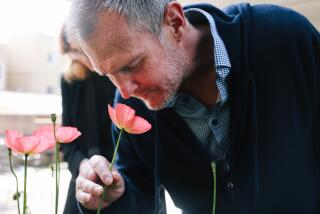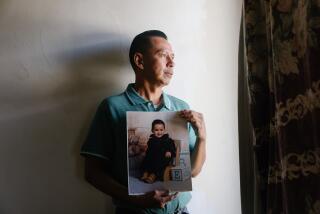Brain Injury Strands Patient Far From Home : Disabilities: A 1985 accident landed a hitchhiker in a California hospital. His family has tried ever since to get him transferred back to the Maryland he remembers.
- Share via
Thousands of miles from home, Jeffrey W. Jennings waits in a locked ward at Metropolitan State Hospital in Norwalk, the victim of a brain injury and of a bureaucracy that has left him stranded far from family and friends.
For five years his family in Maryland has tried to get Jennings moved to a facility in his home state. But because he is poor and has no insurance, Maryland facilities have refused to take him.
Jennings, an unemployed drifter, was hitchhiking home on Aug. 24, 1985, when a car hit him on a highway near Bakersfield. He suffered permanent brain injuries, compound fractures of both legs and a dislocated shoulder.
The bones have healed, but the head injuries have left the 34-year-old Jennings in a mental fog. Most of his memory is gone, relatives say. He is combative at times and needs close supervision.
But “he remembers home,” his sister, Sandra Reed, said in a telephone interview from her home in Gaithersburg, Md. “He does talk about getting a cab and going home.”
Reed has waged an unsuccessful campaign for the past five years to have her brother transferred to a Maryland hospital. Jennings has no family or friends in California, although various relatives have made six trips to visit him since he was injured.
The problem is that Jennings was destitute and had no health insurance at the time of the accident. The 20-year-old driver was not held liable because Jennings was in the roadway and wearing dark clothing when he was hit just before dawn.
Reed and Jennings’ six other siblings say they do not have the money to pay for him to stay in a hospital or nursing home for the rest of his life.
So Maryland would have to pay for his care, which could amount to as much as $100,000 a year, health officials say.
Reed and her brother’s legal advocate, Rob Peters, say penny-pinching health officials in Maryland have tied up the move with bureaucratic red tape. In a last-ditch effort, Reed and Peters have appealed to Maryland Gov. William Donald Schaefer.
“I keep thinking I’m going to get him back one day,” Reed, a computer analyst, said.
Phyllis Eddleman, a division chief in Los Angeles County’s Department of Mental Health, said mentally disabled people frequently have to be transferred to their home states or their home countries. There are about 20 such cases a year in the county, she said.
But it is rare that a patient and family who seek such a transfer are kept waiting for years, she said.
Maryland officials say they have been trying to find an appropriate facility for Jennings but have had no success. They admit that money is a concern, especially with the state trying to weather an economic downturn.
Maryland is not legally obligated to take Jennings back, Maryland and California officials said.
“There are thousands of people in this state that are seeking services who are on waiting lists who are not getting services,” said Mike Golden, a spokesman for Nelson J. Sabatini, Maryland’s secretary of health and mental hygiene. “The most important thing is to make sure this guy is getting services, and he is in California.”
Before the accident, Jennings was a drifter. He often became restless, picked up a duffel bag of belongings and hitchhiked to another part of the country, his family said.
Jennings, who grew up in a foster home, didn’t like school much; he dropped out in the 11th grade. He worked on some construction jobs and in a health spa. But he never kept a job for long.
“He didn’t like being tied down to a particular job,” said Karen Hunter, another of Jennings’ sisters, who also lives in Gaithersburg. “That’s one reason he never was interested in getting married or having a family. He was a free spirit.”
Hunter received a call from her brother late one August night in 1985. Jennings said he wanted to return to Maryland and needed money for a bus ticket. It was close to midnight, so Hunter told Jennings to call her in the morning and she would make arrangements.
“I waited and waited, and Jeff never called back,” Hunter said.
Jennings apparently had decided to hitchhike instead of waiting for bus fare. He was hitchhiking east on California 58 east of Bakersfield at the time of the accident.
Jennings was treated at a local hospital and transferred to Rancho Los Amigos Medical Center in Downey, which is renowned for its treatment of head-injury victims. After about a year of treatment, Jennings was transferred to a nursing home, then to Martin Luther King Jr. Medical Center, and finally to Metropolitan State Hospital in June, 1987.
Most head-injury victims are able to return home or to stay in a nursing home. But a small percentage turn combative and need to be confined. Jennings is given drugs to control his temper.
Reed said that, in her search for a facility for her brother, she has been turned away by private nursing-home officials who said they could not handle a potentially combative young man. Others would not take him because he had no money or health insurance.
Reed said there was a sense of urgency because the family was told by brain-injury experts at Rancho Los Amigos that contact with relatives could help Jennings regain some of his memory.
Jennings still calls his foster mother, Sarah Braxton, 75, of Rockville, Md., about once a month. The conversations are usually a couple of minutes long and not very involved, she said.
“He was here in the county when my husband died (in 1978), but he can’t remember,” Braxton said. “He keeps asking about him. The conversation is very short, the same things over and over.”
Dr. Daniel Shin, co-chief of the brain-injury program at Rancho Los Amigos, said recovery of memory and other mental capacities occurs most rapidly within five years after an accident. But improvement can continue for up to 10 years, he said.
Reed contacted Maryland’s Springfield mental hospital in Sykesville in 1988. The hospital reviewed Jennings’ file but rejected him because he was not suffering from a mental illness, officials said.
Several years ago, Los Angeles County health officials agreed to foot the bill to fly Jennings back to his home state as long as a Maryland facility would accept him. With his family so far away, Jennings was placed under the conservancy of the Public Guardian in Los Angeles County.
Local county and state officials would welcome Jennings’ move to Maryland.
“It’s a twofold motivation,” Eddleman said. “One is the expense, and it’s usually better for the patient when a family wants him and can go visit him.”
In fall, 1989, a frustrated social worker at Metropolitan State Hospital put Reed in contact with Peters, a Los Angeles-based mental health advocate. For several months, Peters and his assistant contacted Maryland health officials to try to arrange the transfer, but they had no luck.
Peters decided to fan some political flames.
He contacted an aide to U.S. Sen. Alan Cranston, who put him in touch with an aide to Maryland Sen. Paul Sarbanes, who put him in touch with Gov. Schaefer’s office last March.
Now that the governor’s office is involved, Reed and Peters have renewed hope that Jennings eventually will make it back to his home state.
Carol Asplen, an aide to Schaefer, said Jennings is under consideration for admission to Maryland’s Deer’s Head convalescent facility in Salisbury. A new wing with four beds for brain-injured people with behavioral problems will soon be open there.
But even if Deer’s Head turns out to be a good fit for Jennings, he could still be stuck in California. Sabatini, Maryland’s health department secretary, could reject the move because of the expense.
“We feel that Mr. Jennings can best progress next to his family in Maryland,” Asplen said. “Unfortunately, Maryland is having financial problems. . . . There are a lot of hoops that have to be jumped through.”
More to Read
Sign up for Essential California
The most important California stories and recommendations in your inbox every morning.
You may occasionally receive promotional content from the Los Angeles Times.













